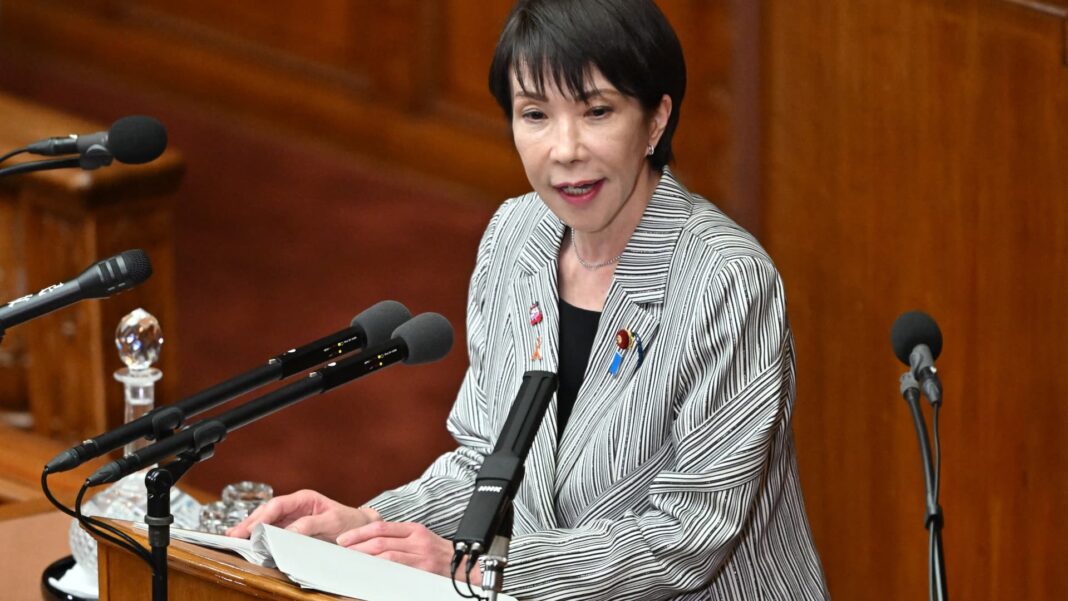Japan’s Prime Minister Sanae Takaichi answers questions from Yoshihiko Noda, leader of the main opposition Constitutional Democratic Party of Japan (CDP), regarding her policy speech at the House of Representatives of the National Diet in Tokyo on November 4, 2025. (Photo by Kazuhiro NOGI / AFP) (Photo by KAZUHIRO NOGI/AFP via Getty Images)
Kazuhiro Nogi | Afp | Getty Images
Just weeks into her office, Japan’s Prime Minister Sanae Takaichi faces an early challenge in the form of declining real wages that threaten her ‘Abenomics’ approach to economics.
Real wages fell for a ninth consecutive month in September, labor ministry data released Thursday showed. On an annual basis, they have not risen since 2021, underscoring the strain on household purchasing power.
To be sure, nominal wages are climbing, but inflation has eroded real incomes. September data showed that nominal wages climbed 1.9% year on year, while real wages declined 1.4%.
This comes as Takaichi has pledged to revive the spirit of “Abenomics,” a policy championed by the late Shinzo Abe, built on three pillars: ultra-easy monetary policy, aggressive fiscal stimulus, and structural reforms.
Within weeks of taking office, Japan’s first woman prime minister reportedly began planning a 13.9 trillion yen ($92.2 billion) spending package to help households cope with rising prices, according to Reuters.
Nikkei reported that the package was over 10 trillion yen, including subsidies for electricity and gas bills, as well as help for small and medium companies to help increase wages.
But those spending plans could clash with Japan’s broader inflation fight.
Headline inflation has exceeded the Bank of Japan’s 2% target for 41 straight months, coming in at 2.9% in September. Household spending that month rose just 1.8%, missing economists’ expectations of 2.5%.
Marcel Thieliant, head of Asia Pacific at Capital Economics, warned that “opinion surveys show inflation is the number one concern for Japanese voters. If Takaichi responds with populist measures such as energy subsidies or cash transfers, that would only enhance those inflationary pressures.”
Japan may also have limited fiscal space to combat inflation. Justin Feng, Asia Economist at HSBC, said an oversized stimulus package funded by government bonds could “potentially diminish Japan’s fiscal credibility.”
The country’s debt-to-GDP ratio is among the highest in the world, standing at almost 250% as of 2023, according to data from the International Monetary Fund.
“If inflation in Japan is still is not below 2% in six to nine months time, the popularity of this cabinet is going to plummet because [for] the Japanese people … the number one, number two, number three concern is inflation.”
Jesper Koll
Expert Director, Monex Group
High inflation could force Takaichi to water down her stance on an expansionary monetary policy, which favors keeping rates low, as this could weaken the yen and increase costs of imported goods.
“The latest real wage data reflects Japan’s persistent inflationary pressures. If the Bank of Japan does not proactively react in a timely fashion, it runs the risk of appearing to fall behind the curve,” Feng pointed out.
BOJ in a bind
The BOJ kept its benchmark interest rate unchanged at 0.5% for a sixth consecutive meeting last month, with Governor Kazuo Ueda reportedly saying the central bank was “not behind the curve” in dealing with inflation.
Though a much softer stance then her pointed criticism of the BOJ’s policy tightening campaign last year, Takaichi reportedly said to parliament earlier this month that the country had not achieved sustainable inflation, signaling that central bank should go slow in raising interest rates.
The central bank has stated that once its sees a “virtuous cycle” of rising prices and wages, it would increase rates.
“Under the new political landscape, the bar is now higher for the Bank of Japan to tighten monetary policy,” said Feng.
But this does not mean that the BOJ will necessarily be deterred. “The current process of policy normalization will gradually continue. In our view, the question on future rate hikes is a matter of when, not if,” Feng added. Capital Economics’ Thieliant forecasts that the BOJ will lift its policy rate to 1.5% by 2027.
Analysts told CNBC that containing inflation would be paramount for the Takachi administration, and some BOJ board members have called for raising rates to combat inflationary pressures.
Japan has a large population of retirees drawing pensions and those on a fixed income, making inflation “very painful” for them, Tomohiko Taniguchi, special advisor at the Fujitsu Future Studies Center, told CNBC’s “Squawk Box Asia” last month.
Jesper Koll, expert director at financial services firm Monex Group also said in October, “if inflation in Japan is still is not below 2% in six to nine months time, the popularity of this cabinet is going to plummet because [for] the Japanese people … the number one, number two, number three concern is inflation.”

